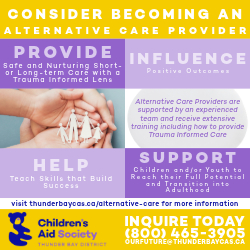By Jon Thompson
Natural awe sweeps into the towns and First Nations nestled between this ancient mountain range and the world’s largest freshwater sea. Northwestern Ontario feels inclined to say, “We have our problems” (by which we mean “poverty”), but anyone who’s seen the view from here feels lucky to be in on the secret.
The secret is precious for those who don’t have a personal tussle with that poverty problem. By Canadian standards, Thunder Bay has decent food, culture, golf, skiing, and trails. Our living costs could dress medical specialists in an outsized home, a camp on the lake, and travel on vacation. Yet in February, our municipal leaders pleaded with Ontario to help fill 77 regional physician and 55 specialist vacancies.
It’s not about quality of life. It’s about quality of work—a diagnosis that’s finally coming around.
While the Northern Ontario School of Medicine’s retention numbers have fallen, there are more nursing vacancies in this region than anywhere in the province. Kenora’s down to half the doctors it needs. Red Lake has suspended obstetrics. According to Marcello Bernardo, manager of communications and engagement with Thunder Bay Regional Health Sciences Centre, our city’s hospital is “facing unprecedented financial pressures,” running “regularly” over capacity and $15 million over budget.
Universal health care architect Tommy Douglas said Canada’s character test is “how we look after each other, not how we look after ourselves.” We need to look after the working conditions of the healers now, as they are the ones who look after us.
The health profession’s cultural motivating force, the world over, forever, is healing others. Ontario’s myopic focus on financial incentives to recruit and retain them is asking them to look out for themselves. Money’s great, but have you tried a functional workplace with reasonable paperwork and finding meaning in your service? That’s the healer’s reward.
In Marathon, a town of 3,000 people that’s just as resource-starved as we all are, doctors adopted consensus decision-making in 1996, and their team’s ability to grow together has meant they’ve retained a full complement ever since. There is a way.
That way is harder to walk if you’re taking care of yourself. Ontario’s decades-long plan to keep costs down by freezing hospital growth has frozen the system’s ability to build capacity, opening a Pandora’s box of parasitic relationships that are costing us more and serving us less. While Doug Ford’s government diverted billions of dollars from health care to pay down debt ahead of schedule, it allowed for private clinics and paid them more than twice what public hospitals receive to perform the same procedures.
Remoteness and that poverty problem make for-profit hospitals risky up here, but the north’s out in the cold. A 2023 Auditor General’s investigation found Ontario has no plan to deliver unique northern services, like B.C. or Saskatchewan have. Northern care has been eroding while plans have been stonewalled in bureaucracy since 2009, never producing anything.
And the agencies responsible for health care retention don’t monitor regional success.
Declining care then bolsters the incentive for staff to save themselves. Over the five years Ontario unconstitutionally capped public nurses’ salaries, the number of private nurses doubled. But in northern Ontario, they multiplied 25-fold, fleeing the public system like it was on fire. Those nurses cost us three times as much, dipping deeper into the quality of care they’re able to provide.
There’s a great risk for those still romantically clinging to the healing incentive. Those workers our government hailed as heroes during the pandemic have been doing more with less for so long that the ranks of professions like paramedics have literally been decimated, burning out in volumes we’ve never seen. A recent poll conducted by Nanos Research of 750 northern nurses shows four-fifths experience stress and over half “dread going to work.”
Shovelling money into privatization while burning the staff for heat is a formula I’m afraid leads to “moral injury,” a type of post-traumatic stress whose study began in the military and is spreading through the helping professions. It’s the mental baggage of carrying out your orders against your ethics. “You get this feeling of overwhelming remorse and guilt based on news you have to deliver that has nothing to do with any part of your job,” one nurse who’s off on disability told me. “The family’s all there together waiting and, ‘Oh, sorry.’ And no one knows the reason. That doesn’t just go away. You have to sit with that messiness in your brain and no one else cares about it.”
Ontario needs to bet it all that healthcare professionals will love living up north if we take care of their quality of work. Of course, most of the pressure would diffuse if we prioritized looking after each other’s “social indicators of health.” That’s another code word for poverty, I know. But “We’re looking after it” would be a sweeter sell than, “We have our problems. Just look after yourself.”















